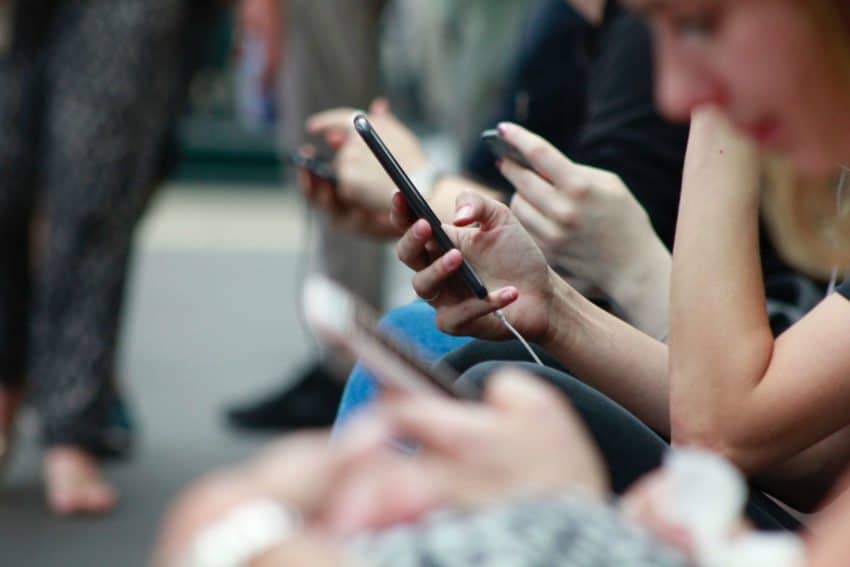How Have Cell Phones Changed Us Socially?
Updated: June 19, 2024
Published: March 14, 2020

Where is your cell phone right now? Chances are it’s within arm’s length from you. Have you sent a text message or several today? The likely answer is also yes. If you’ve found yourself asking, “How have cell phones changed us socially?” The answer is plenty. Researchers have studied how different age groups use cell phones, and how cell phones affect social interaction and communication skills.
Most people have become at least partially dependent on their cell phones for more than just convenience. Cell phones are now a primary way of communicating and keeping one’s social life in tact.
Let’s take a look at how cell phones have affected our lives both positively and negatively.

Photo by ROBIN WORRALL on Unsplash
Why Are Young Adults Attached to Their Phones?
Recent research has found that younger cohorts use their phones differently than older adults.
Researchers conducted a study that observed the differences between how people aged 18-24, 25-34, 35-49, and 50-68 use their phones.
They found that:
- Young adults send text messages much more often than older groups
- In the group older than 50, 80% sent or received fewer than 10 texts a day
- 90% of every age group makes less than 10 calls a day
This is because young adults rely on text messaging to be their primary way of communicating with friends. Younger people text more often and in more situations, whereas adults first consider whether or not text messaging is the right form of communication to say what they want to say.
What’s the effect of all this?
Expectations in relationships have shifted. Because people are attached to their phone and can virtually text from anywhere, people expect quick response times. This is especially true of those in romantic relationships.
Furthermore, since so many people rely on text messaging, some researchers are finding that communication skills are suffering. For example, MIT sociologist Sherry Turkle warns that “conversation is the most human and humanizing thing that we do. It’s where empathy is born, where intimacy is born…we’ve actually moved away from conversation in a way that my research was showing is hurting us.”
Even if you aren’t using a cell phone to make a plan or talk with a friend, you probably involved a phone in your last face-to-face interaction. 89% of Americans took out a phone in their last conversation with someone and 82% said it hurt the conversation they were actually having.
The truth of the matter is that cell phones aren’t to blame. There’s both good and bad aspects of having a phone; however, the most important aspect is how we as humans choose to use them.
Pros of Cell Phones
There’s no doubt that cell phones have revolutionized the world and peoples’ ability to communicate.
1. Constant Connection:
With a cell phone, you are always connected to people. You can send a message at any time and contact people easily across time zones.
2. Information and Accessibility:
Cell phones provide a limitless resource in terms of education, information, and accessibility in the palm of your hands. This is so true that you can even earn your degree from the University of the People by using your phone. What’s more, to study with UoPeople is 100% tuition-free!
3. Time and Efficiency:
Cell phones allow you to do so much on the go, which can save you time. With endless applications, the ability to communicate via different platforms, send photos, etc., you can get a lot done with nothing more than one powerful device.
4. Social Network:
Social networking apps have changed how people make friends, maintain friendships, and share memories.
Cons of Cell Phones
Everything that has a good side also has some bad. Here are some of the detrimental effects that cell phones can cause:
1. Security:
We store so much of our information on our cell phones. From notes with passwords, credit card information, personal photos, and more, people are always at risk of being hacked or the phone being stolen.
2. Dependence:
Remember the days when you used to know phone numbers by heart? You may be young enough that you never even did this! We rely so heavily on our phones for directions and information that we are limiting the power of our personal memory.
3. Decreased Communication Skills:
Although cell phones also have opened the door to be able to communicate in different ways (text message, social media messaging, photos, etc.), they have also hurt live interactions because people are constantly on their phones or checking them which detracts from the present moment. They also may enable anti-social behaviors because people get buried in their phones.
4. Lack of Nature:
The addiction to technology is often met by the sacrifice of being one with nature. When you give a child a cell phone, for example, they may spend more time with technology and less time playing outside.
5. Reliance:
A lot of people have an addiction to their cell phones and can’t function without them.
6. Incorrect Spelling and Grammar:
Since people abbreviate and use text lingo when on their phones, it has changed the way people write and communicate. The use of emojis has become a language in itself, and this is sometimes at the expense of proper grammar usage.

Photo by Meghan Schiereck on Unsplash
Cell Phones are Changing Humans, Socially and More
1. Empathy:
More often than not, the ability for true understanding and, in turn, empathy relies on body language, tone of voice, and eye contact. With cell phones, we often lose these important aspects of communication, such that empathy may suffer.
2. How We Learn:
We are able to learn so much digitally. There’s no doubt that technology has shifted how we learn. Just look at online universities as a primary depiction of this. At the University of the People, you can earn your degree with nothing more than an internet connection. All you need to know about UoPeople is just a click away!
3. Memory:
Cell phones can both help and hurt our memory. For example, relying on GPS rather than memory to navigate means that you are less observant of your surroundings. However, in some ways, phones are our memory partner. Since they can save so much information for us, it may offload from our brain and give us the space we need to remember the important things.
The Bottom Line
Cell phones have reshaped communication in both good and bad ways. The ability to connect from anywhere to anyone around the globe has its upsides. However, because a cell phone is a tool, it depends on how we as humans use them to determine if they are ultimately serving us or hurting us.
